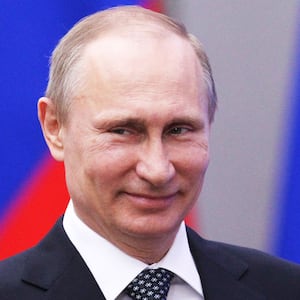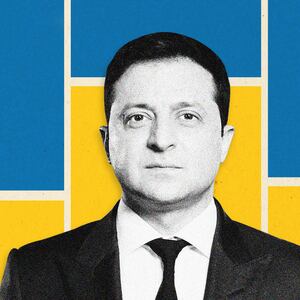Vladimir Putin and Donald Trump have a lot in common. But here’s one similarity you probably haven’t thought of: A lot of their supporters trust Putin and Trump more than they trust their own families.
Let’s start with Vlad. In case you missed it, Sunday’s New York Times reported that some Ukrainians are facing “backlash from family members in Russia, who refuse to believe that Russian soldiers could bomb innocent people, or even that a war is taking place at all.”
One Russian father told his son, who actually lives in Ukraine, “There are Russian soldiers there helping people. They give them warm clothes and food.” And one Russian woman told her sister, who lives in Ukraine, that “No one is bombing Kyiv, and you should actually be afraid of the Nazis, whom your father fought against.”
Who are you going to believe: Something your dad saw on Putin’s state TV or your own lying eyes?
For Ukrainians fighting for their lives, these are not esoteric political disagreements between two family members with a similar claim to the truth. In this case, one group is getting its news from Russian propaganda outlets, while the other group is getting news firsthand—in the form of bombs, bullets, and rockets.
But hey, gotta hear both sides, right?
Of course, for American readers, the elephant in the room has orange hair and a comb-over. At the risk of conflating an authoritarian state where there is no independent media with Fox News viewers in the U.S., this New York Times piece reads like a giant subtweet.
Trump is never mentioned, and yet, there is an unspoken subtext. After all, a lot of us live in a world where a significant number of our friends and family still believe (often, despite pleas from family) that Donald Trump won the election and that Democrats are operating a vast pedophile ring.
And—as Ukrainians may soon learn—sometimes our refusal to endorse these delusions leads to familial estrangement.
“My dad’s cousins sent me a petition—a certified letter—saying they disowned me because I’m in ‘the devil’s army’ now,” Rep. Adam Kinzinger disclosed last year in an interview last year with Anthony Fisher (now my editor at the Beast). “It’s been crazy, when you have friends—that you thought were good friends that would love you no matter what—that don’t.”
Kinzinger, one of the few GOP members of Congress to resist Trump’s attempts to overturn the election, represents an extreme example. But numerous Americans have a similar story.
I’m not a congressman, but I, too, was stunned back in 2016 when most of my extended family started moving toward Trump. Then, days before the 2016 election, and after I told my mom that I feared Trump’s authoritarian tendencies, she voted for him.
I love my mom, but I was perplexed. If your family member worked in politics or journalism and personally knew many of the players, would you take his or her warnings to heart? Would you trust the lived experience of your flesh-and-blood relative (assuming he or she is a decent person who shares your general values) who has expertise regarding the topic over that of complete strangers on TV or radio?
After four years of Trump, my mom and one of her sisters decided to sit out the 2020 presidential election—unlike most of my large extended family, who happily pulled the lever again for Trump.
The main difference between mom and the rest is that she doesn't watch Fox News.
“The Fox News effect” is real. A few years ago, author Luke O’Neil interviewed people whose families were changed by Fox News.
One story involved a man who watched his Puerto Rican uncle “becoming a Fox News junkie, and turning on his own people,” as he put it, in the aftermath of Hurricane Maria. “He was literally sitting in the dark and still defending Trump,” the nephew said. This story reminds me of the people who would rather die of COVID than betray their Trumpy politics by getting vaccinated.
As I write this, millions of people in Ukraine are enduring a brutal assault by one of the most powerful armies in the world, and some can’t get their Russian parents to believe it is even happening. The lesson here is that propaganda is powerful, and nobody is completely immune.
In the past, I thought the inability to distinguish truth from falsehoods occurred rarely, and only in delusional minds or cult members who needed to be deprogrammed. But this phenomenon is so pervasive that I am inclined to believe that simply preventing our own brainwashing may be the greatest individual responsibility of the modern media age.
Eventually, you are what you see and hear.
Now that Putin has shut down any trustworthy media outlets in the country, the people of Russia can be forgiven for believing misinformation.
What’s our excuse?







